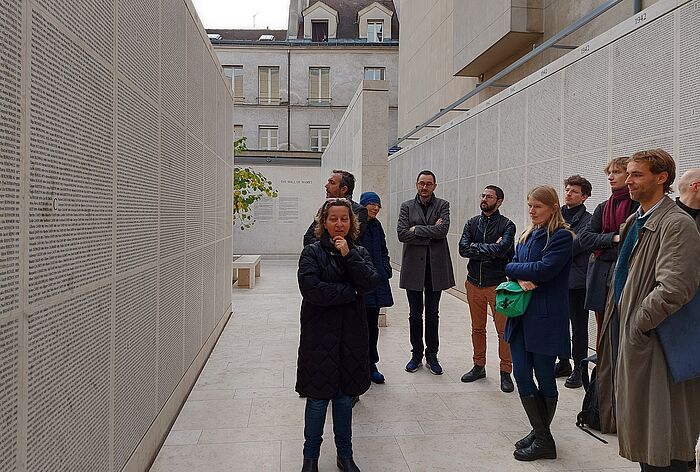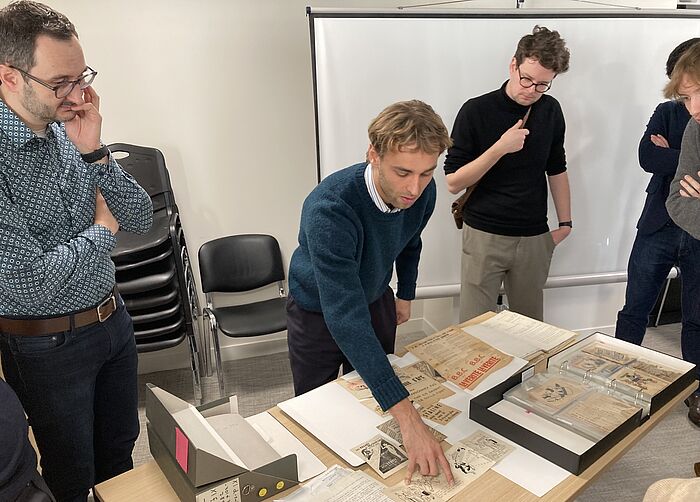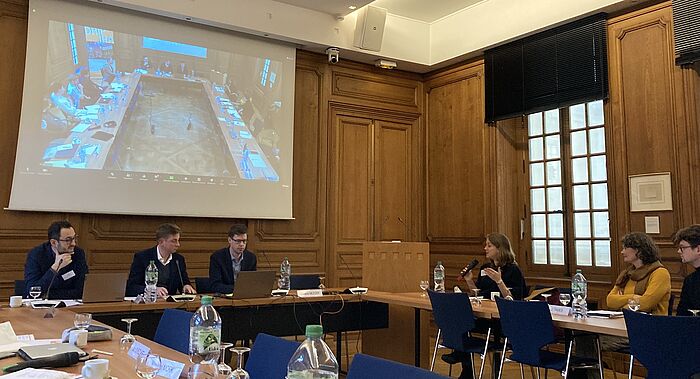- The Institute
- Research
- Dictatorships in the 20th Century
- Democracies and their Historical Self-Perceptions
- Transformations in Most Recent History
- International and Transnational Relations
- Edited Source Collections
- Dissertation Projects
- Completed Projects
- Dokumentation Obersalzberg
- Center for Holocaust Studies
- Berlin Center for Cold War Studies
- Publications
- Vierteljahrshefte
- The Archives
- Library
- Center for Holocaust Studies
- News
- Dates
- Press
- Recent Publications
- News from the Institute
- Topics
- Munich 1972
- Confronting Decline
- Feminist, Pacifist, Provocateur
- Der Mauerbau als Audiowalk
- Digital Contemporary History
- Transportation in Germany
- Envisaged Futures at the End of the Cold War
- From the Reichsbank to the Bundesbank
- German Federal Chancellery
- History of Sustainabilities: Discourses and Practices since the 1970s
- Changing Work
- Democratic Culture and the Nazi Past
- The History of the Treuhandanstalt
- Foreign Policy Documentation (AAPD)
- Dokumentation Obersalzberg
- Hitler, Mein Kampf. A Critical Edition
- "Man hört, man spricht"
- Dates
- Press
- Recent Publications
- News from the Institute
- Topics
- Munich 1972
- Confronting Decline
- Feminist, Pacifist, Provocateur
- Der Mauerbau als Audiowalk
- Digital Contemporary History
- Transportation in Germany
- Envisaged Futures at the End of the Cold War
- From the Reichsbank to the Bundesbank
- German Federal Chancellery
- History of Sustainabilities: Discourses and Practices since the 1970s
- Changing Work
- Democratic Culture and the Nazi Past
- The History of the Treuhandanstalt
- Foreign Policy Documentation (AAPD)
- Dokumentation Obersalzberg
- Hitler, Mein Kampf. A Critical Edition
- "Man hört, man spricht"
Third International INFOCOM Workshop in Paris
Three-day conference with the German Historical Institute Paris and the Centre de recherches historiques (EHESS)
On November 23-25, 2022, the INFOCOM Project held its third international workshop at the German Historical Institute Paris, an event held in cooperation with the Centre de recherches historiques (EHESS). Entitled "Informal Communication in Occupied Societies: World War II, Postwar Transitions, and the Search for Meaning in Societies at War," the three-day conference enabled historians from across Europe and the United States to explore questions of communication and sense-making in societies grappling with military occupation.
A detailed report on the workshop has now been published by the Occupation Studies Research Network
The full program of events included:
Organizers: Caroline Mezger and Manuel Mork (IfZ), Alexandre Bibert and Jürgen Finger (DHIP), Florent Brayard (CRH/EHESS)
Wednesday, 23 November
Welcome note: Mareike König (Paris)
Caroline Mezger (Munich): Informal Communication in Occupied Societies: An Introduction
Panel 1: Political Communication on the Brink of War
Chair: Jürgen Finger (Paris)
- Alexandre Bibert (Paris): Anti-War Demonstrations as a Form of Anonymous Communication in the Early Phase of World War II
- Till Knobloch (Chapel Hill/Berlin): Failure to Communicate or: How to Reach a Dictator?
Panel 2: Accessing Informal Communication through Digitized Collections
Chair: Mareike König (Paris)
- Milan van Lange & Ismee Tames (Amsterdam): Communication, Knowledge and Meaning Making Through the Lens of Two (Digitized) World War II Collections: »First-Hand Accounts of War« and the »Special Jurisdiction« Collection at NIOD
Thursday, 24 November
Visit of the Centre de documentation juif contemporain
Panel 3: Making Sense and Making Decisions: Persecuted Jews in France and Western Europe
Chair: Florent Brayard (Paris)
- Johanna Lehr (Paris): Le »savoir-persécuté« of the Jewish Victims in Occupied France Through the Archives of the Union Générale des Israélites de France
- Jan Burzlaff (Harvard): Informal Communication and Survival in Nazi-Occupied Western Europe: A Bottom-Up Framework
Panel 4: Trying to Understand the Big Picture: How to Recognize Genocide
Chair: Elżbieta Janicka (Warsaw)
- Damien De Santis (Paris): Comprendre la déportation. La circulation de l’information concernant les déportations raciales au départ de la France (1942–1945)
- Renée Poznanski (Beer-Sheva): Voices of a Silence: What the Underground Press Conveyed without Words
- Caroline Mezger (Munich): Communicating Atrocity: Forced Migrants as Conveyors of Knowledge on Nazi Crimes

Friday, 25 November
Panel 5: Rumors vs. Propaganda: The Transmission of Information in Occupied Europe
Chair: Jürgen Finger (Paris)
- Louis Fortemps (Leuven/Lille): »Gerüchte und Flüsterpropaganda«: The German Propaganda-Abteilung and the Monitoring, Surveillance, and Countering of Informal Communication in Occupied Belgium and Northern France (1940–1944)
- Manuel Mork (Munich): Doomed to Failure? The Propaganda-Abteilung Frankreich Confronted with the Absence of Media Credibility (1940–1944)
- Izabela Paszko (Munich): »We‘ll whisper it in your ear that it’s going to be crummy with the Germans...«: Rumors in Occupied Polish Society
Panel 6: Communication and Miscommunication in Occupied Germany
Chair: Alexandre Bibert (Paris)
- Felix Berge (Munich): Time to Flee? Informal Communication on the Eve of Soviet and American Occupation in Saxony (1945)
- Valentin Bardet (Lyon): Monitoring the Rumor: French in Occupied Germany and the Translation of Informal Communication
- Felix Streicher (Maastricht): Buzz in the Borderlands: Rumors and Fears of Territorial Annexation in the Luxembourgish Occupation Zone in Post-War Germany (1945–1949)




